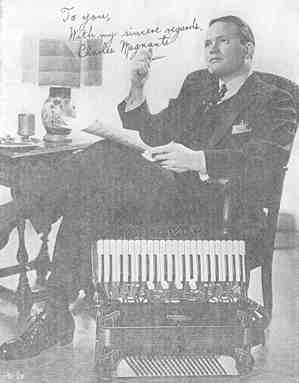Composing


To speak of "composing" or of "being a composer" may at first sound very learned, impressive, and something rather beyond the sphere of the average individual. As it happens, however, a talent for creativeness in music can be born in anyone, a laborer whistling at his work may subsconsciously [sic] originate sample melodies. He is a composer, though he scarcely realizes it and the creations of his mind probably will never reach the concrete form of written notes.
Proportionately, I believe, there are more composers among accordionists as a class than among any other group as musicians. The explanation for this undoubtedly lies in the fact that the accordion is the easiest instrument on which to improvise. The minute you improvise you are inventing, and from that it is only a step to composing.
The first and foremost requisite for worth-while composing, of course, is that intangible thing called inspiration. No rules can be given for finding it: inspiration is something that you achieve without effort or not at all. However, anyone who has the desire to attend symphony and the opera, becomes acquainted with them through phonograph records if no other way is possible. Fine music is the most stimulating influence you can have toward composing. If you have any music in your soul, it will bring it to the fore.
Speaking of inspiration, it might be of interest to mention how "Accordiana" came to be written, as it is probably the most popular number I have ever composed. It was about ten years ago, and I was playing with a small salon orchestra at the Hotel Barclay. During one of our performances I became conscious of a melody running through my mind. As soon as we were free, I rushed to the musicians' room and within fifteen minutes had played "Accordiana" almost exactly as I later wrote it down.
It is my custom, whenever I have an idea for a number, to play it over, then let it rest for a few days or a week. I then play it again, and if it still sounds good and something really original, I write it out. Very often a melody that sounded fine on the spur of the moment will seem worthless upon a second, critical hearing. Because of the elusiveness of inspiration, I fine it impossible to write a number "to order." There is bound to be a difference in a deliberately manufactured theme and one that is the result of real inspiration.
The actual writing of your composition is something else again. It is a well-known fact that some of our most popular and prolific composers, such as Irving Berlin, have no idea real knowledge of writing music, and cannot do more than pick out a melody. Someone else must do the actual writing for them. So you can see the lack of a fundamental knowledge of music is not an unsurmountable handicap for composing. Naturally, though, it is much more satisfactory and desirable if you can pen your own musical ideas. To do this the study of harmony and counterpoint is essential.
When the new composer has completed a number which he feels is real good, his thoughts become concerned with how to get it published. That's not easy, make no mistake about that. Any music publisher in putting out a new piece must invest a certain amount of money to do so, and naturally wants to be sure of getting it back. It is practically useless mail a a composition to a publisher. The best bet is, if you possibly can, to make a personal contact with a publisher and play your number for him, or to have someone do this for you. If you are in an orchestra or have friends in one, and can manage to have them "plug" your number and that it can be brought to the attention of a publisher, that is your best chance of "selling" him. Once you have written a success, it is naturally much easier to command attention. Until then, the composer is likely to feel the most unappreciated of mortals.
Next month I will take up the subject of arranging for the accordion, which is a field in itself, and dependent on skill and knowledge rather than the elusive something we call inspiration.
The Classical Free-Reed, Inc. staff gratefully acknowledges volunteer Patrick Kiley who assisted in the production of this article, as well as Stanley Darrow and his comprehensive American Accordion Musicological Society library.
| Charles Magnante: Background For Success, Part 3 |
| Charles Magnante: Background For Success, Part 4 |
| Charles Magnante: Background For Success, Part 5 |
| Invitation to Contributors / Submission Guidelines |
| Back to The Free-Reed Journal Contents Page |
| Back to The Classical Free-Reed, Inc. Home Page |